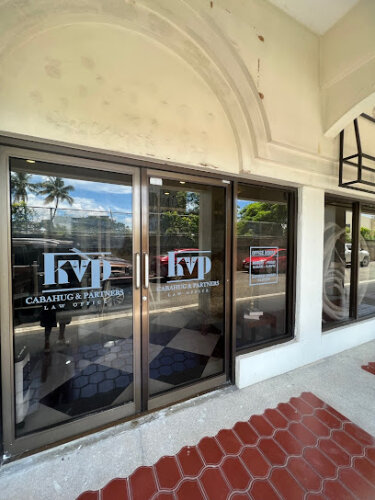Best Family Lawyers in Cebu City
Share your needs with us, get contacted by law firms.
Free. Takes 2 min.
Free Guide to Hiring a Family Lawyer
List of the best lawyers in Cebu City, Philippines
Philippines Family Legal Questions answered by Lawyers
Browse our 110 legal questions about Family in Philippines and read the lawyer answers, or ask your own questions for free.
- For the cenomar
- Ask klng po pano po gagawin sa cenomar na kinuha ko my same matches sa marriage pro Hindi namn po Ako ang nagpakasal at ang family name ginamit ung same Ng middle name ko pro wla po ang family name ko nkalagay
-
Lawyer answer by CAGUIA TAN & CUA Law Offices
You need to file a petition for correction of your cenomar and we can help you with that.
Read full answer - Under what clauses of annulment should I file to my ex husband who is a bisexual?
- Hello. I was married with my ex husband last 2023 - civil wedding. We only live under the same roof for at least 2 months and after that things went rough. He is bisexual with past relationship of 7 years same sex live in before me. I accepted him for... Read more →
-
Lawyer answer by CAGUIA TAN & CUA Law Offices
You may file a petition for declaration of nullity of marriage before the court. We can definitely assist you with that.
Read full answer - How much would it cost to nullify a marriage contract
- Nullify a marriage contract by reason of a previous marriage of partner
-
Lawyer answer by Romano Legal Services
YOu can file a Petition for Declaration of Nullity of Marriage and establish the fact of your partner's previous valid marriage. I can take your case for 200k. On top of this amount, I would also be charging you: Appearance...
Read full answer
Philippines Family Legal Articles
Browse our 2 legal articles about Family in Philippines written by expert lawyers.
- How to File for Divorce in the Philippines: Step-by-Step
- Philippine family law is mainly governed by the Family Code and generally does not allow divorce for non-Muslim couples, so spouses usually file for declaration of nullity, annulment, or legal separation instead. By default, property acquired during the marriage is shared between spouses (absolute community or conjugal partnership), unless a... Read more →
- Understanding the Annulment in the Philippines: A Complete Guide
- Deciding to legally end a marriage is never easy. It is a path filled with emotional challenges and tough choices, particularly in the Philippines where the annulment process can be a long and draining journey. If you find yourself at this crossroads seeking clarity and direction, this guide is here... Read more →
About Family Law in Cebu City, Philippines
The laws pertaining to family in Cebu City, Philippines are largely derived from the Civil Code of the Philippines and the Family Code of the Philippines. These codes cover a wide spectrum of issues including marriage and family relations, property rights, inheritance and succession, children’s rights, child custody, adoption, and divorce (technically known as annulment in the Philippine legal system). As these laws can be complex, it often requires expert legal help from a family lawyer to fully navigate these issues.
Why You May Need a Lawyer
Engaging the services of a lawyer may be necessary in numerous situations related to Family Law. These instances include adoption proceedings, filing for legal separation, annulment or divorce, establishing or challenging paternity, negotiating prenuptial or postnuptial agreements, and addressing issues related to child custody and child support. A lawyer can provide you with guidance, protect your rights, and ensure that all procedures are correctly followed.
Local Laws Overview
Key aspects of local laws in Cebu City related to Family Law include the requirement of a marriage license for legal marriage, the prohibition of divorce (except for marriages between a Filipino and a foreigner where the foreigner initiates the divorce abroad), stringent conditions for legal separation and annulment, and rules governing property relations between spouses. Child custody is usually awarded to the mother for children under 7 years old, but the court's primary concern is always the best interests of the child. Inheritance and succession laws are complex, and the enforcement of these laws often requires legal assistance.
Frequently Asked Questions
Can I get a divorce in Cebu City, Philippines?
Divorce is generally not recognized in the Philippines, including Cebu City. The primary mechanism to end a marriage is through the filing of an annulment, legal separation, or a declaration of nullity of marriage. There are specific grounds for each procedure which you must fulfill to proceed.
How is child custody determined?
In Philippine family law, children under 7 years old are placed under the mother's custody, unless there is a compelling reason not to do so. For children older than seven, a child’s preference can be considered. The court's primary concern is always the best interests of the child.
Can I draft a prenuptial agreement?
Yes, prenuptial agreements, or marriage settlements, are recognized by the Family Code of the Philippines. These agreements can establish the property relations of the couple during the marriage. Legal counsel is needed to ensure enforceability and adherence to pertinent laws.
How does adoption work in Cebu City?
Adoption in Cebu City follows the process laid out in the Domestic Adoption Act. A number of steps are required, including home study, and counseling sessions, and court proceedings. A lawyer can guide you through this process.
How are properties divided upon annulment or legal separation?
Property division depends on the nature of the couple's property regime. The default regime is absolute community of property, where properties are split equally. However, the regime may be modified by a prenuptial agreement.
Additional Resources
Agencies like the Department of Social Welfare and Development, Office of the Solicitor General, and the Public Attorney's Office, among others, can provide assistance. A number of non-government organizations working on family law issues and rights are also available in Cebu City.
Next Steps
If you need legal assistance, it is advisable to immediately consult with a lawyer specialized in family law. Ensure that you have all necessary documents and be ready to discuss your case frankly. Taking swift action can often help in achieving the most favorable outcome.
Lawzana helps you find the best lawyers and law firms in Cebu City through a curated and pre-screened list of qualified legal professionals. Our platform offers rankings and detailed profiles of attorneys and law firms, allowing you to compare based on practice areas, including Family, experience, and client feedback.
Each profile includes a description of the firm's areas of practice, client reviews, team members and partners, year of establishment, spoken languages, office locations, contact information, social media presence, and any published articles or resources. Most firms on our platform speak English and are experienced in both local and international legal matters.
Get a quote from top-rated law firms in Cebu City, Philippines — quickly, securely, and without unnecessary hassle.
Disclaimer:
The information provided on this page is for general informational purposes only and does not constitute legal advice. While we strive to ensure the accuracy and relevance of the content, legal information may change over time, and interpretations of the law can vary. You should always consult with a qualified legal professional for advice specific to your situation.
We disclaim all liability for actions taken or not taken based on the content of this page. If you believe any information is incorrect or outdated, please contact us, and we will review and update it where appropriate.
Browse family law firms by service in Cebu City, Philippines
Cebu City, Philippines Attorneys in related practice areas.
















